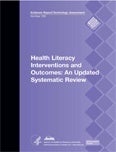Health Literacy Interventions and Outcomes: An Update of the Literacy and Health Outcomes Systematic Review of the Literature, Agency for Healthcare Research and Quality (AHRQ), 2011. This report is an update to a 2004 systematic review of the relationship of health literacy levels on health care service use and health outcomes. It documents disparities in health outcomes and effectiveness of interventions designed to improve outcomes of individuals with low health literacy.
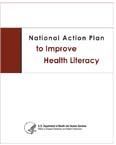 The National Action Plan to Improve Health Literacy, Department of Health and Human Services, 2010. This document contains seven goals that will improve health literacy and suggests strategies for achieving these goals. The goals are based on the principle that everyone has the right to accesible health information and understandable health services.
The National Action Plan to Improve Health Literacy, Department of Health and Human Services, 2010. This document contains seven goals that will improve health literacy and suggests strategies for achieving these goals. The goals are based on the principle that everyone has the right to accesible health information and understandable health services.
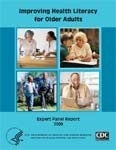 Improving Health Literacy for Older Adults, Center for Disease Control, 2009. To address concerns about health literacy, the CDC convened an Expert Panel on Improving Health Literacy for Older Adults in 2007. This meeting was designed to assess health litearcy issues among older adults and to identify opportunities for health professionals at CDC and other organizations to better meet the health communication needs of older adults. The report provides an overview of panel presentations and discussion.
Improving Health Literacy for Older Adults, Center for Disease Control, 2009. To address concerns about health literacy, the CDC convened an Expert Panel on Improving Health Literacy for Older Adults in 2007. This meeting was designed to assess health litearcy issues among older adults and to identify opportunities for health professionals at CDC and other organizations to better meet the health communication needs of older adults. The report provides an overview of panel presentations and discussion.
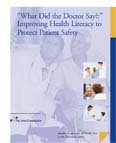 What did the Doctor Say?: Improving Health Literacy to Protect Patient Safety, Joint Commission on Accreditation of Healthcare Organizations 2007. This report is part of the series “Healthcare at the Crossroads,” published by the Joint Commission on Accreditation of Healthcare Organizations. The Joint Commission convened an expert Roundtable panel that was comprised of a broad range of stakeholders who are accountable for addressing health literacy. This report represents the culmination of that Roundtable’s discussion and provides recommendations to improve health literacy, reduce communication-related errors and better support the interests of patients and providers of care alike.
What did the Doctor Say?: Improving Health Literacy to Protect Patient Safety, Joint Commission on Accreditation of Healthcare Organizations 2007. This report is part of the series “Healthcare at the Crossroads,” published by the Joint Commission on Accreditation of Healthcare Organizations. The Joint Commission convened an expert Roundtable panel that was comprised of a broad range of stakeholders who are accountable for addressing health literacy. This report represents the culmination of that Roundtable’s discussion and provides recommendations to improve health literacy, reduce communication-related errors and better support the interests of patients and providers of care alike.
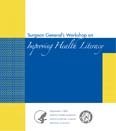 Surgeon General’s Workshop on Improving Health Literacy, Department of Health and Human Services, 2006. This report is a result of a workshop convened by Acting Surgeon General Kenneth Moritsugu on Sept. 7, 2006. Three panels were convened to discuss health literacy: Literacy and Heatlh Outcomes; Meeting the Health Litearcy Needs of Special Populations; and Moving Toward and Informed and Enaged Public. This report provides a summary of these panel presentations and the discussion that followed.
Surgeon General’s Workshop on Improving Health Literacy, Department of Health and Human Services, 2006. This report is a result of a workshop convened by Acting Surgeon General Kenneth Moritsugu on Sept. 7, 2006. Three panels were convened to discuss health literacy: Literacy and Heatlh Outcomes; Meeting the Health Litearcy Needs of Special Populations; and Moving Toward and Informed and Enaged Public. This report provides a summary of these panel presentations and the discussion that followed.
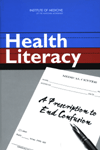 Health Literacy: A Prescription to End Confusion, National Academies Press, 2004. The Institute of Medicine, National Academies of Science, impaneled a Committee on Health Literacy. The report defines health literacy and its scope, identifies obstacles to creating a health literate public, assesses the approaches that have been attempted to increase health literacy, and identifies goals for health literacy efforts as well as key players who may contribute to these goals.
Health Literacy: A Prescription to End Confusion, National Academies Press, 2004. The Institute of Medicine, National Academies of Science, impaneled a Committee on Health Literacy. The report defines health literacy and its scope, identifies obstacles to creating a health literate public, assesses the approaches that have been attempted to increase health literacy, and identifies goals for health literacy efforts as well as key players who may contribute to these goals.
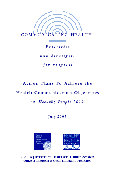 Healthy People 2010, Objective 11-2. Improvement of Health Literacy, Communicating Health: Priorities and Strategies for Progress, Action Plans to Achieve the Health Communication Objectives in Healthy People 2010, 2003.
Healthy People 2010, Objective 11-2. Improvement of Health Literacy, Communicating Health: Priorities and Strategies for Progress, Action Plans to Achieve the Health Communication Objectives in Healthy People 2010, 2003.
*note Healthy People 2020 will be released shortly, the Health Literacy objective remains the same.
All of the proposed strategies and solutions depend on building increased awareness of the magnitude of health literacy problems in the United States and on identifying systemic changes that will make U.S. health systems easier for individuals to understand and use. A critical link among literacy, health, and health status must be recognized at a broad societal level. Ensuring health literacy in the United States is a fundamental issue of fairness and basic human rights.
